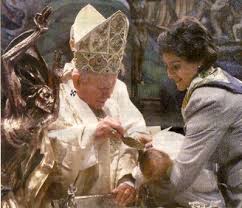Is it Always God’s Will to Heal?

Is it Always God’s Will to Heal?
In the Gospel reading for Friday, the Eighth Week in Ordinary Time, we find this from Mark 11:23-24:
Truly, I say to you, whoever says to this mountain, “Be taken up and cast into the sea,” and does not doubt in his heart, but believes that what he says will come to pass, it will be done for him. Therefore I tell, whatever you ask in prayer, believe that you receive it, and you will.
In the “Word of Faith” movement, a popular charismatic movement that has now spanned much of the globe since its founding by E.W. Kenyon and Kenneth Hagin in the last century, this text is often used just as we see below from Kenneth Copeland, another leader of the WOF, from his website:
Are you praying for something big? Healing from cancer? A restored marriage? The best job you’ve ever had? How do you know your prayer will be answered? If you believe you receive when you pray (Mark 11:24-25), your answer is on the way!
Now, in Copeland’s defense, and in defense of these Word of Faith preachers in general, he and they will emphasize the fact that not all prayers are, in fact, answered as we would like. They will point out the truth that there are other factors to consider when it comes to healing and why people are not healed. Two commonly considered are:
- Some may not be healed due to a lack of faith. This is true. Jesus makes that quite clear in Matthew 13:58.
- Some may not be healed because of unrepentant sin. That too is clear in texts of Scripture like Psalm 66:18 and 1 John 3:22.
The problem with this short list (and others I have found) is that the reasons for “failure” to receive are always found in the requestor. But this is not always the case. For example:
- All Christians are called to suffer as Christ suffered, not necessarily because of their own sins or lack of faith, but because Christians are called to “complete what is lacking in Christ’s afflictions for the sake of his body, that is, the church” (Col. 1:24). Christians are called to suffer for other people’s salvation as well as their own, walking “in the footsteps of Christ” (1 Pet. 2:21-24; cf. Rom. 8:17; 2 Cor. 1:5-7; Phil. 3:8-12; 1 Pet. 4:16-17).
- It may be that the petitioner is not healed because it is simply not God’s will to heal him. Perhaps the clearest example of this truth can be found in the famous “thorn in the flesh” of St. Paul in 2 Corinthians 12:7-9. Remember, Paul asked God three times for healing—i.e., to remove this “thorn in the flesh,” as he called it. God’s response was no! Or, in our Lord’s words: “My grace is sufficient for you, for my power is made perfect in weakness.” Paul then responded, “I will all the more gladly boast of my weaknesses, that the power of Christ may rest upon me” (v. 9). The Greek word for weaknesses is asthenias, which is the same word used for “infirmities” in Matthew 8:17, which references Isaiah 53:4: “He took our infirmities and bore our diseases.”
Moreover, we have to remember not to fall prey to the error of lifting one passage of Scripture out of context and absolutizing it to the detriment of other texts. All of Jesus’ words must be understood as coming from the same Jesus who prayed, “Not my will, your will be done” (Mark 14:36). So whatever we are asking for must first be God’s will for us to possess. If we’re asking God for something against his will—even if we don’t know that’s what we’re doing—it makes sense that God would not grant it to us. That is precisely what St. John brings to the discussion in 1 John 5:14-15: “… if we ask anything according to his will he hears us. And if we know that he hears us in whatever we ask, we know that we have obtained the requests made of him.”
Coming from an Assemblies of God background, I remember suffering from the same root theological error here that the Word of Faith Movement suffers from. It is a belief that because Jesus “took our infirmities” on the cross, and “by his stripes we were healed,” according to 1 Peter 2:24 (cf. Isa. 53:3-5), this means that what Christ accomplished on the cross by way of healing can and will be fully appropriated in our lives now, this side of the veil, if we but have faith. Herein lies the fatal flaw.
The New Testament reveals that the fullness of the atonement of Christ will not be applied in our lives until we are perfected in heaven. For example, Romans 8:23 says plainly, “We wait for adoption as sons, the redemption of our bodies.” Our bodies are not redeemed yet! The older I get, the more profound this truth becomes! Just getting out of bed in the morning can be revelatory!
At times, and according to God’s will, the grace of God purchased for us on the cross will be applied in healing our bodies, but that is not the norm. That is what Scripture refers to as a “miracle.” And miracles do happen, but not always. Not even usually! Paul asks, “Do all work miracles? Do all possess gifts of healing?” (1 Cor. 12:29-30). The answer is no!
Moreover, it’s not just our bodies that are not redeemed. Our souls, too, though “redeemed” through baptism, are not yet fully and finally redeemed, either. They are still subject to sin and “infirmity.” That is why Paul will say, “Since we have these promises, beloved, let us cleanse ourselves from every defilement of body and spirit, and make holiness perfect in the fear of God” (2 Cor. 7:1). And that is why redemption is seen in Scripture as not only an accomplished reality in the life of Christians, but also as a future and contingent reality (Luke 21:28; Eph. 4:30; see also the Catechism of the Catholic Church 1069).
Make no mistake: this error is anything but trivial. It represents a shallow form of Christianity that tends to ignore the reality that everyone is not healed—even those with the greatest of faith. It teaches that everyone who is a true believer is supposed to be healed. And unfortunately, it can lead to a loss of faith in times of real crisis—when a child dies, or when a person is, in fact, not healed of a grave illness.
The truth is, we must trust God in all things. We cannot always know our own hearts (see Jer. 17:9) or the will of God in many of the matters we face. Paul tells us that now, “we know in part and we prophesy in part” (1 Cor. 13:12). When we ask God to heal us and we persevere in prayer, there is a time simply to accept and rejoice in God’s will, even if his will is not yet our will. Our Lord’s example is the paradigm for us in the spiritual life . . . always: “not what I will, but what you will.”
The will of “the man, Jesus Christ” (see 1 Tim. 2:5) was always in conformity with God’s will. Ours is not. But if we would but pray the words of Christ in faith, begging for God’s grace, we will be amazed to find that our will—bit by bit—conforms to God’s. Ultimately, that is the only way to true peace. And what we discover over and over in the spiritual life is that God has a tendency to work far more powerfully through our infirmities than he would have done through our supposed strengths.






